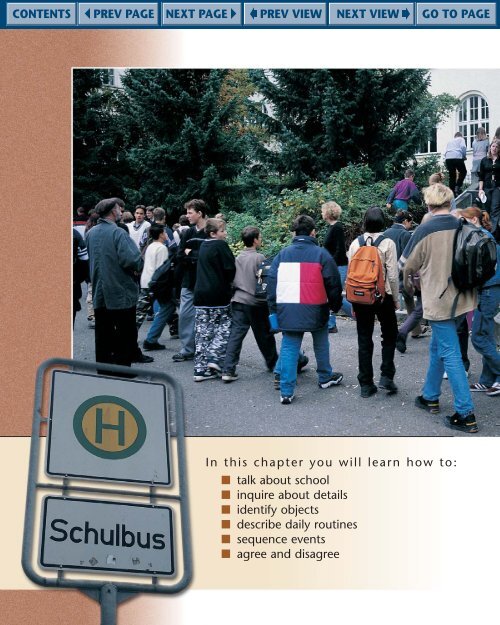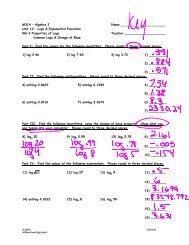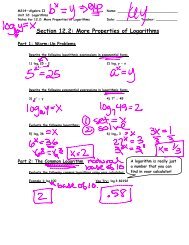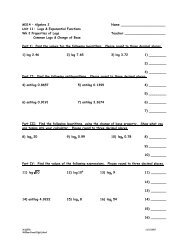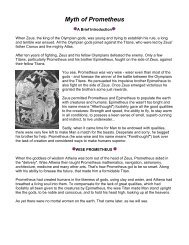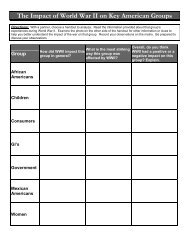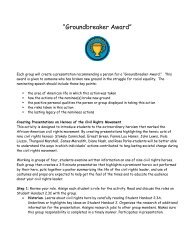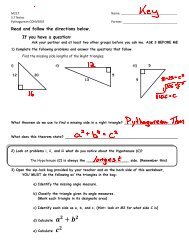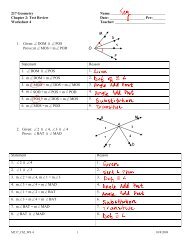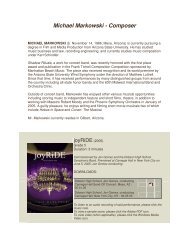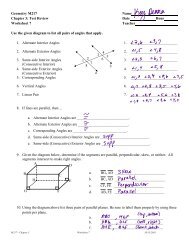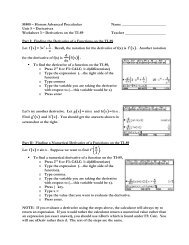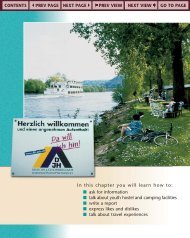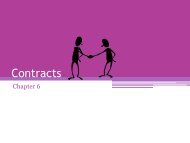You also want an ePaper? Increase the reach of your titles
YUMPU automatically turns print PDFs into web optimized ePapers that Google loves.
In this chapter you will learn how to:<br />
talk about school<br />
inquire about details<br />
identify objects<br />
describe daily routines<br />
sequence events<br />
agree and disagree
kapitel<br />
4<br />
Schule<br />
89
CD Tracks 1–2<br />
You may want<br />
to add these<br />
words for<br />
items found in<br />
your<br />
classroom:<br />
der<br />
Lehrertisch<br />
(teacher’s<br />
table/desk);<br />
der Overheadprojektor/<br />
Folienprojektor<br />
(overhead<br />
projector); die<br />
Projektionsfläche<br />
projection<br />
screen/area;<br />
die Leinwand<br />
screen; die<br />
Videokassette<br />
videocassette;<br />
der<br />
Videorekorder<br />
video recorder<br />
(VCR); das<br />
Übungsheft<br />
exercise book,<br />
workbook; die<br />
Heftmaschine<br />
stapler; der<br />
Spitzer<br />
(pencil)<br />
sharpener.<br />
WB<br />
Activities 1–3<br />
GV<br />
Activity 1<br />
Q 1<br />
OT<br />
Activities<br />
27–29<br />
LEKTION A<br />
Die Klasse<br />
90 <strong>Kapitel</strong> 4
1<br />
2<br />
Lektion A<br />
Rate mal! (Guess!)<br />
Guess the name of each object in German, including its<br />
article. This object is used to...<br />
1. erase a word that was incorrectly penciled in.<br />
2. point out the location of a city.<br />
3. learn some information as you page through it.<br />
4. write the answers on several pages that are bound<br />
together.<br />
5. write some information on the board.<br />
6. indicate that the class period is over.<br />
7. retrieve electronic information.<br />
8. sit on.<br />
9. write with and use as an eraser.<br />
10. measure line length and draw straight lines.<br />
Wer oder was ist das?<br />
Identify the missing words. The beginning letters of each<br />
word, when read in sequence, will spell out the topic of<br />
this chapter. Although you haven’t learned the words<br />
sitzen and Geometrie, can you guess what they mean?<br />
1. Silke sitzt auf einem ___.<br />
2. Petra und Elisabeth spielen Computerspiele auf dem ___.<br />
3. Wir machen die Hausaufgaben im ___.<br />
4. Wie viel ___ ist es? Es ist halb drei.<br />
5. Für Geometrie brauchen wir ein ___.<br />
6. Herr ___ ist der Deutschlehrer.<br />
Was lesen sie?<br />
Wo machen sie die Hausaufgaben?<br />
1. der Radiergummi<br />
2. die Landkarte<br />
3. das Buch<br />
4. das Heft<br />
5. die Kreide<br />
6. die Uhr<br />
7. der Computer<br />
8. der Stuhl<br />
9. der Bleistift<br />
10. das Lineal<br />
TPR Activity: Ask students<br />
to show the rest of the<br />
class various classroom<br />
objects. Example: Stefan,<br />
zeig Renate, wo der<br />
Bleistift ist! Stefan looks<br />
around, gets up and goes<br />
to a student’s desk where<br />
a pencil is found and says<br />
Hier ist der Bleistift while<br />
picking it up and showing<br />
it to the rest of the class.<br />
Before students<br />
understand what they are<br />
supposed to do, you may<br />
want to demonstrate it<br />
first yourself.<br />
1. Stuhl<br />
2. Computer<br />
3. Heft<br />
4. Uhr<br />
5. Lineal<br />
6. Eberhard<br />
91
CD Tracks 3–4<br />
LA<br />
Q<br />
2<br />
Activities 1–2<br />
Daniel<br />
Wie klug du bist!<br />
Matthias<br />
Sebastian<br />
Daniel: Warum bist du so nervös?<br />
Matthias: Wir haben heute Mathe. Die Probleme sind ganz<br />
schwer.<br />
Sebastian: Meinst du? Sie sind doch leicht.<br />
Matthias: Für dich.<br />
Sebastian: Wo ist denn dein Rechner?<br />
Matthias: Zu Hause.<br />
Daniel: Ohne Rechner geht’s auch nicht.<br />
Matthias: Wie klug du bist!<br />
92 <strong>Kapitel</strong> 4
3<br />
4<br />
Was fehlt hier?<br />
1. Wo ist der ___ von Matthias? Er ist zu ___.<br />
2. Ist Matthias heute ___? Ja, er hat ___.<br />
3. Sind die Probleme für Mathe ___? Nein, sie ___ schwer.<br />
4. Geht es in Mathe ___ Rechner? Nein, das geht ___.<br />
Auf Deutsch, bitte!<br />
A German exchange student in your school insists on<br />
speaking English as he wants to learn the language. You<br />
have the opposite goal: you want to learn German.<br />
Answer all his questions in German.<br />
1. Do you have math today?<br />
2. Is math easy?<br />
3. Is math at 9:30?<br />
4. Are you a little nervous?<br />
5. Are you going home later?<br />
Fürdich<br />
After attending the elementary school<br />
(Grundschule) for four years, most students<br />
continue either at the junior secondary<br />
school (Hauptschule) or at the intermediate<br />
secondary school (Realschule). The rest of<br />
the students, slightly more than<br />
one-fourth, will continue from grades 5<br />
through 13 at the senior secondary school<br />
(Gymnasium). Upon successfully passing<br />
oral and written examinations during<br />
their last year, students receive the final<br />
certificate (Abitur) which is a prerequisite for<br />
attending a university (Universität). In recent years,<br />
considerable changes have been made to<br />
accommodate students’ interests. A<br />
so-called reformed upper phase (reformierte<br />
Oberstufe) has replaced conventional classes.<br />
Students now choose the courses they are<br />
most interested in.<br />
Lektion A<br />
Sie sind in der Grundschule.<br />
1. Rechner, Hause<br />
2. nervös, Mathe<br />
3. leicht, sind<br />
4. ohne, nicht<br />
CD<br />
Track 5<br />
Sample answers:<br />
1. Ja, ich habe heute<br />
Mathe.<br />
2. Nein, Mathe ist<br />
schwer.<br />
3. Nein, Mathe ist um<br />
halb elf.<br />
4. Ja, ich bin etwas<br />
nervös.<br />
5. Ja, ich gehe später<br />
nach Hause.<br />
93
emcp.com<br />
WB Activities 4–5<br />
GV Activities 2–3<br />
Q<br />
3<br />
Help introduce the<br />
accusative by pointing at<br />
students, asking Kennst du<br />
den Peter? (die Monika,<br />
die Uschi, den Roland) and<br />
have students respond, Ja,<br />
ich kenne den Peter. (die<br />
Monika, die Uschi, den<br />
Roland).<br />
Students attending the<br />
Gymnasium have a very<br />
concentrated curriculum.<br />
It is not uncommon for<br />
these students to take at<br />
least ten or more different<br />
subjects a week. A typical<br />
schedule readily shows<br />
the emphasis on academic<br />
subjects.<br />
SPRACHE<br />
The Definite Article (Accusative Singular)<br />
In the sentence Andrea kauft die Karte (Andrea buys the ticket), Andrea<br />
is called the subject (nominative), kauft the verb and die Karte the<br />
direct object (accusative) of the sentence.<br />
Kennst du den Onkel? Do you know the uncle?<br />
Ich höre die Musik. I am listening to the music.<br />
Wir lesen das Buch. We are reading the book.<br />
SINGULAR<br />
masculine feminine neuter<br />
nominative der die das<br />
accusative den die das<br />
From the chart, you can see that the die and das articles do not<br />
change in the accusative and that der changes to den. In informal<br />
conversations, names are often preceded by a form of der or die.<br />
Kennst du den Peter? Do you know Peter?<br />
Sie hat den Kuli in der Hand.<br />
94 <strong>Kapitel</strong> 4
5<br />
6<br />
Lektion A<br />
Wo ist...?<br />
You always seem to misplace things. Ask where each<br />
one is.<br />
Wo ist das Buch?<br />
Möchtest du das?<br />
Your father or mother is asking what you would like for<br />
your birthday. As he or she points to certain items, you<br />
indicate that you would like each one.<br />
Ja, ich möchte die Schultasche.<br />
CD Track 6<br />
1. Wo ist der Kuli?<br />
2. Wo ist das Papier?<br />
3. Wo ist das Heft?<br />
4. Wo ist der Bleistift?<br />
5. Wo ist der<br />
Radiergummi?<br />
6. Wo ist das Lineal?<br />
CD<br />
Track 7<br />
1. Ja, ich möchte die<br />
Gitarre.<br />
2. Ja, ich möchte das<br />
Buch.<br />
3. Ja, ich möchte den<br />
Computer.<br />
4. Ja, ich möchte den<br />
Kuli.<br />
5. Ja, ich möchte die CD.<br />
6. Ja, ich möchte die<br />
Uhr.<br />
95
CD<br />
Track 8<br />
7<br />
1. Ich kaufe das Video<br />
hier.<br />
2. Ich kaufe den Kuli<br />
hier.<br />
3. Ich kaufe das Papier<br />
hier.<br />
4. Ich kaufe die<br />
Schultasche hier.<br />
5. Ich kaufe den<br />
Bleistift hier.<br />
6. Ich kaufe den<br />
Computer hier. 8<br />
Was kaufst du?<br />
You and your friends are going shopping. Everyone<br />
seems to be buying something different. Your friends<br />
tell you what they are buying, but they also want to<br />
know what you plan to purchase.<br />
Ich kaufe die CD. Und du?<br />
Ich kaufe das Buch hier.<br />
1. Ich kaufe den Fußball. Und du?<br />
2. Ich kaufe die Karte. Und du?<br />
3. Ich kaufe den Rechner. Und du?<br />
4. Ich kaufe das Lineal. Und du?<br />
5. Ich kaufe die Uhr. Und du?<br />
6. Ich kaufe den Krimi. Und du?<br />
der, die, das oder den?<br />
Complete each sentence using the appropriate form of<br />
the article.<br />
1. den<br />
1. Kennst du ___ Lehrer?<br />
2. das<br />
3. das<br />
4. die<br />
2.<br />
3.<br />
Kaufen Sie ___ Klavier?<br />
Wir lesen ___ Buch.<br />
5. die<br />
4. Wo hast du ___ Schultasche?<br />
6. den<br />
7. den<br />
8. das<br />
5.<br />
6.<br />
Wann beginnt ___ Schule?<br />
Ich brauche ___ Kuli.<br />
7. Habt ihr ___ Bleistift?<br />
96<br />
8. Renate spielt ___ Computerspiel.<br />
<strong>Kapitel</strong> 4
AHohenzollern-Gymnasium in Sigmaringen<br />
ktuelles<br />
A visitor to a German Gymnasium may assume that the<br />
curriculum and academic activities are the same in all<br />
secondary high schools in Germany. Such an assumption will<br />
most likely prove to be incorrect. Although local and regional<br />
differences from one Gymnasium to another become quite<br />
apparent, there are nevertheless many similarities.<br />
The Hohenzollern-Gymnasium is located in Sigmaringen, a<br />
small town in southern Germany, about 30 miles north of<br />
Switzerland and 70 miles northwest of Austria. The school was<br />
founded in 1818, at which time most of the students were<br />
taught by the clergy. Since 1975, when a new school was built,<br />
the Hohenzollern-Gymnasium has been a public secondary<br />
school under the jurisdiction of the City of<br />
Sigmaringen.<br />
The school is attended by 680 students (grades<br />
5-13) in 28 classes. Less than half of these<br />
students come directly from Sigmaringen, with<br />
the rest commuting from 26 other towns or<br />
communities. Most students come by bus or<br />
train. During the warmer months, many<br />
students ride their bikes or walk to school. Since<br />
German teenagers cannot get a driver’s license<br />
before they are 18, only very few students come<br />
by car or motorcycle. About 4 percent of the<br />
students in this school are foreigners from such<br />
countries as Turkey, Afghanistan, Italy, Hungary<br />
and Yugoslavia.<br />
School starts Monday through Friday at 7:45 A.M. Each class period is<br />
45 minutes long. After the first two periods, there is a 15-minute<br />
recess (Große Pause) followed by two more periods with a second 10minute<br />
recess. After another two periods, students are dismissed<br />
three of the five days at 12:50 P.M. On the other two days, students<br />
have a lunch break (Mittagspause) until 2:20 P.M. and get out of school<br />
after 4:55 P.M. Most students bring sandwiches or snacks to school<br />
which they eat during their recess or lunch break. They also can<br />
purchase food in a cafeteria around the block from the school or at a<br />
fast-food restaurant nearby. Beverages can be bought from a vending<br />
Lektion A<br />
Wie kommen sie in die<br />
Schule?<br />
Die Stadt Sigmaringen<br />
The name Hohenzollern<br />
goes back to the Graf von<br />
Zollern in the 11th century.<br />
In the year 1805, the<br />
Duchy of Hohenzollern<br />
became a sovereign<br />
principality and remained<br />
as such until 1849 when it<br />
was integrated into<br />
Prussia. Today, there are<br />
still some family members<br />
of the royal family in the<br />
Sigmaringer Schloss.<br />
97
Was lernen sie?<br />
machine located in the hallway of the school or from<br />
the school’s janitor.<br />
Students have a choice of following three curriculum<br />
tracks. First, they may enroll in the ancient language<br />
track (altsprachlicher Zug) taking Latin, English and<br />
Greek. French can be substituted for Greek in the<br />
ninth grade. Second, they can select the modern<br />
language track (neusprachlicher Zug) with emphasis on<br />
English, French and Latin. Finally, they can take the<br />
natural science track (naturwissenschaftlicher Zug) that<br />
emphasizes such subjects as mathematics, physics,<br />
chemistry and biology.<br />
Another characteristic of this school is its strong<br />
music program from fifth through eighth grade.<br />
Ninth graders can choose to take music rather than a<br />
third foreign language. Depending on the students’<br />
ability and interest, each class schedule may look<br />
considerably different. The following is a possible<br />
class schedule for a tenth grade<br />
student:<br />
MEIN STUNDENPLAN<br />
ZEIT MONTAG DIENSTAG MITTWOCH DONNERSTAG FREITAG<br />
7.45–8.30 Englisch Sport Gemeinschaftskunde Biologie Mathematik<br />
8.35–9.20 Mathematik Sport Religion Griechisch Englisch<br />
9.20–9.35 Große Pause Große Pause Große Pause Große Pause Große Pause<br />
9.35–10.20 Griechisch Geschichte Griechisch Mathematik Gemeinschaftskunde<br />
10.25–11.10 Chemie Mathematik Englisch Englisch Geschichte<br />
11.10–11.20 Pause Pause Pause Pause Pause<br />
11.20-12.05 Physik Latein Latein Deutsch Religion<br />
12.10–12.55 Deutsch Deutsch Chor Chemie Latein<br />
14.20–15.05 Biologie Kunst<br />
15.10–15.55 Griechisch Musik<br />
98<br />
Explain what these subjects in this student’s class schedule mean:<br />
Gemeinschaftskunde social studies; Kunst art.<br />
<strong>Kapitel</strong> 4
You will notice that this student<br />
as well as many of his classmates<br />
have 15 subjects scattered<br />
throughout the weekly school<br />
schedule. Particularly noteworthy<br />
is the fact that students in several<br />
grades must take either religion<br />
or ethics. Religion is offered as<br />
Protestant or Catholic instruction<br />
and exposes students primarily to<br />
the history and philosophy of<br />
Protestantism and Catholicism as<br />
well as other world religions.<br />
Students who don’t want to<br />
attend these classes must take<br />
ethics instead.<br />
At the end of their final year at<br />
this Gymnasium, students receive their Abitur certification after<br />
passing two oral and three written examinations. The final grade is a<br />
combination of the scores on these examinations, as well as a<br />
calculated average of various basic and selected courses.<br />
The Hohenzollern-Gymnasium sponsors student exchange programs<br />
(Austauschprogramme) with schools in France and with Overland High<br />
School in Aurora, Colorado. Throughout the year, students have<br />
several recreational opportunities. They go on at least two field trips<br />
(Klassenausflüge) and can also participate during the Wintersporttag in<br />
various winter activities such as skiing, skating, etc. Finally, students<br />
can participate in some school-sponsored sports tournaments, in<br />
several choirs and in theater performances.<br />
Lektion A<br />
Die deutsche Klasse besucht eine High School in Colorado.<br />
Er ist Englischlehrer in der<br />
12. Klasse.<br />
WB Activities 6–7<br />
Q<br />
4<br />
Have students point out<br />
some differences and<br />
similarities between this<br />
German school and their<br />
own. You may want to<br />
have them also discuss<br />
what aspects they prefer,<br />
and why.<br />
99
1. 15<br />
2. the Abitur<br />
3. Latin and Greek<br />
4. 9 years<br />
5. They can’t get a<br />
driver’s license until<br />
they are 18 years old.<br />
6. 4 hours<br />
7. Ethics<br />
8. by bus or train<br />
9. at 9:20 A.M.,<br />
11:10 A.M. and after<br />
2:20 P.M.<br />
10. United States and<br />
France<br />
CD<br />
Track 9<br />
9<br />
Was weißt du?<br />
1. How many subjects a week do many tenth graders have?<br />
2. What do students receive<br />
after passing their final<br />
written and oral<br />
examinations?<br />
3. What are the two ancient<br />
languages offered?<br />
4. How many years do<br />
students go to a<br />
Gymnasium?<br />
5. Why don’t most 17-yearold<br />
Germans drive a car?<br />
6. How often does this tenth<br />
grade student have<br />
English during the week?<br />
7. What class can students take instead<br />
of Religion?<br />
8. How do most students get to school?<br />
9. When can students eat a snack?<br />
10. To which countries does this school<br />
have some ties?<br />
Persönliches<br />
1. Wer ist dein Deutschlehrer oder<br />
deine Deutschlehrerin?<br />
2. Was ist für dich schwer?<br />
3. Hast du einen Rechner? Wo ist er? Das steht auf einer Tafel in der Schule.<br />
4. Wo ist dein Deutschbuch?<br />
5. Was brauchst du für die Schule?<br />
6. Was gibt es alles in deiner Deutschklasse? (Name at least<br />
eight items including articles.)<br />
R O L L E N S P I E L<br />
At what age can Germans go to the<br />
Fahrschule and get their driver’s license?<br />
Working with a partner, take turns telling one another to point at an<br />
object in the classroom. Use a question such as Wo ist die Landkarte? The<br />
answer may be Die Landkarte ist da (hier, dort, da drüben). Make sure to<br />
include the article when identifying various classroom objects.<br />
100 <strong>Kapitel</strong> 4
Wörter und<br />
A u s d r ü c k e<br />
DESCRIBING A CLASSROOM<br />
der Lehrer,- teacher (male)<br />
die Lehrerin,-nen teacher (female)<br />
der Bleistift,-e pencil<br />
der Computer,- computer<br />
das Heft,-e notebook<br />
die Kreide chalk<br />
der Kuli,-s (ballpoint) pen<br />
die Landkarte,-n map<br />
das Lineal,-e ruler<br />
das Papier paper<br />
der Radiergummi,-s eraser<br />
die Schultasche,-n schoolbag<br />
der Stuhl,¨-e chair<br />
die Tafel,-n (chalk) board<br />
der Tafellappen,- rag (to wipe off board)<br />
der Tisch,- table<br />
die Uhr,-en clock<br />
GV Activity 4<br />
CA<br />
Activities 1–4<br />
Lektion A<br />
ABOUT SCHOOL<br />
Wer ist dein Deutschlehrer? Who is your<br />
German teacher?<br />
Was brauchst du? What do you need?<br />
Meinst du? Do you think so?<br />
Ohne Rechner geht’s nicht. It won’t work<br />
without a calculator.<br />
nervös nervous<br />
schwer difficult, hard<br />
leicht easy<br />
Die Hausaufgaben sind<br />
nicht schwer.<br />
CD Track 10<br />
101
CD Tracks 11–12<br />
LEKTION B<br />
102 OT<br />
Activity 29<br />
<strong>Kapitel</strong> 4
1O<br />
11<br />
Lektion B<br />
Was für Fächer hat Bettina am Mittwoch?<br />
Can you figure out the seven subjects that Bettina has<br />
every Wednesday? To find the answers, you need to<br />
combine the appropriate syllables.<br />
LO SIK<br />
ZÖ GI LA SISCH<br />
TIK ERD MA ON RE MA<br />
TEIN LI GIE THE KUN BIO<br />
DE FRAN MU<br />
Eine Umfrage (A Survey)<br />
Imagine that you are enrolled in a German<br />
Gymnasium. Your host family inquires about your new<br />
schedule. You have the same schedule that is presented<br />
above. Beantworte die Fragen!<br />
1. Um wie viel Uhr beginnt die Erdkundeklasse?<br />
2. Was hast du um viertel vor zwölf am Montag?<br />
3. Wie viele Französischstunden hast du in der Woche?<br />
4. Um wie viel Uhr ist Große Pause?<br />
5. Wann hast du Biologie?<br />
6. Wann kommst du am Freitag aus der Schule?<br />
7. Um wie viel Uhr beginnt die Schule?<br />
8. Was hast du um zwanzig vor elf am Donnerstag?<br />
GV Activities 5–6<br />
OT<br />
Activities 30–31<br />
Personalize your questions.<br />
(Was für Fächer hast du?,<br />
Wie oft hast du Deutsch?—<br />
Englisch, Geschichte...?,<br />
etc.)<br />
You may want to add<br />
these subjects, which are<br />
commonly taught in<br />
American schools: Chor<br />
(choir), Informatik<br />
(computer science),<br />
Computer,<br />
Anwendungsprogramme<br />
(computer applications),<br />
Kunst (art),<br />
Fahrunterricht (driver’s<br />
training), Geowissenschaft<br />
(earth science),<br />
Gesundheitserziehung/<br />
Gesundheitswesen<br />
(health),<br />
Hauswirtschaftslehre<br />
(home economics),<br />
Maschineschreiben<br />
(keyboarding, typing).<br />
RELIGION, FRANZÖSISCH,<br />
ERDKUNDE, MUSIK,<br />
MATHEMATIK, BIOLOGIE,<br />
LATEIN<br />
1. Um 9 Uhr 50.<br />
2. Physik.<br />
3. Drei.<br />
4. Um 9 Uhr 30 und um<br />
11 Uhr 25.<br />
5. Am Montag und am<br />
Mittwoch.<br />
6. Um 1 Uhr 20.<br />
7. Um 7 Uhr 55.<br />
8. Englisch.<br />
103
CD Tracks 13–14<br />
WB Activities 8–9<br />
GV Activity 7<br />
LA<br />
Activity 3<br />
Ich mache noch schnell meine<br />
Arbeit.<br />
Am Computer<br />
Der Computer ist gut genug.<br />
Gabriele:<br />
Wir spielen zuerst Karten.<br />
Dieser Computer ist aber sehr langsam.<br />
Lehrer: Na ja, für die Informatikaufgaben ist er gut genug.<br />
Gabriele: Oh, es klingelt schon. Jetzt geht’s nach Hause.<br />
Diana: Noch nicht ganz. Ich mache noch schnell meine<br />
Arbeit.<br />
Gabriele: Warum denn? Komm her! Wir spielen zuerst Karten.<br />
Diana: Du hast Recht. Die Arbeit kommt später.<br />
104 <strong>Kapitel</strong> 4
12<br />
13<br />
Lektion B<br />
Fragen<br />
Beantworte diese Fragen!<br />
1. Wie ist der Computer?<br />
2. Was meint der Lehrer?<br />
3. Geht Diana gleich nach Hause?<br />
4. Was spielen beide Mädchen?<br />
5. Wann macht Diana ihre Arbeit?<br />
Was passt zusammen?<br />
1. Ist er klug?<br />
2. Es klingelt.<br />
3. Sind die Probleme leicht?<br />
4. Machst du jetzt deine Arbeit?<br />
5. Wo spielst du Karten?<br />
6. Ist dieser Computer alt?<br />
7. Ich bin ganz nervös.<br />
8. Ohne Rechner sind die Matheaufgaben zu schwer.<br />
A. Warum denn? Wir haben doch heute keine Mathe.<br />
B. Nein, schwer.<br />
C. Du hast Recht.<br />
D. Oh, es ist schon halb zwei. Dann geht’s gleich nach Hause.<br />
E. Ja, ein Schlauberger.<br />
F. Am Computer.<br />
G. Ja, und auch sehr langsam.<br />
H. Vielleicht später.<br />
Ist dieser Computer alt?<br />
CD<br />
Track 15<br />
1. Er ist sehr langsam.<br />
2. Er meint, er ist für die<br />
Informatikaufgaben gut<br />
genug.<br />
3. Nein, Diana geht nicht<br />
gleich nach Hause.<br />
4. Sie spielen Karten.<br />
5. Sie macht ihre Arbeit<br />
später.<br />
1. E<br />
2. D<br />
3. B<br />
4. H<br />
5. F<br />
6. G<br />
7. A<br />
8. C<br />
105
Q 5–7<br />
WB Activities 10–11<br />
GV Activities 8–11<br />
Q<br />
8<br />
Fürdich<br />
Grades in German<br />
schools are assigned<br />
by numbers (1-6)<br />
rather than letters (A,<br />
B, C, D, F) as we know<br />
them. The following<br />
grading system is<br />
commonly used:<br />
1 = sehr gut/ausgezeichnet (very good/excellent)<br />
2 = gut (good)<br />
3 = befriedigend (satisfactory)<br />
4 = ausreichend (adequate)<br />
5 = mangelhaft (inadequate)<br />
6 = ungenügend (unsatisfactory)<br />
It is difficult to receive a 1 (eine Eins) in a German high school<br />
(Gymnasium). Getting a 1 is similar to receiving an A+ in our high<br />
schools. Both 5 and 6 are considered failing grades. Generally, tests and<br />
quizzes in German schools are more subjective (essay) and contain<br />
fewer objective-type answers (multiple choice, true and false).<br />
SPRACHE<br />
Question Words: Wer? Wen? Was?<br />
Both question words wer (who) and wen (whom) ask about a person.<br />
Wer inquires about the subject of the sentence, whereas wen asks<br />
about the direct object of the sentence.You can use either word,<br />
regardless of the gender and number of the noun. To inquire about<br />
objects, you must use the question word was (what).<br />
Heike wohnt in Dresden. Heike lives in Dresden.<br />
Wer wohnt in Dresden? Who lives in Dresden?<br />
Ich kenne die Lehrerin. I know the teacher.<br />
Wen kennst du? Whom do you know?<br />
Wir kaufen die Gitarre. We are buying the guitar.<br />
Was kauft ihr? What are you buying?<br />
106 <strong>Kapitel</strong> 4
14<br />
15<br />
Lektion B<br />
Wer wohnt dort?<br />
Pretend it’s noisy and you can’t hear what is being said<br />
about where various people live. So you ask whom they<br />
are talking about.<br />
1.<br />
Frau Schiller wohnt in der Stadt.<br />
Wer wohnt in der Stadt?<br />
Susanne wohnt gleich um die Ecke.<br />
2. Der Lehrer wohnt hier.<br />
3. Petra wohnt beim Kaufhaus.<br />
4. Karin und Petra wohnen in Hamburg.<br />
5. Frau Tobler wohnt in Deutschland.<br />
6. Wir wohnen da.<br />
Was/Wen kennst du?<br />
Imagine you haven’t visited your uncle for years. He<br />
doesn’t know how much you still remember from the<br />
time you saw him last.<br />
Was kennst du? (Kaufhaus)<br />
Ich kenne das Kaufhaus.<br />
Wen kennst du? (Christine)<br />
Ich kenne die Christine.<br />
1. Was kennst du ? (Stadt)<br />
2. Wen kennst du? (Dieter)<br />
3. Wen kennst du? (Heidi)<br />
4. Was kennst du? (Film)<br />
5. Wen kennst du? (Onkel)<br />
6. Was kennst du? (Schule)<br />
das Kaufhaus<br />
CD Track 16<br />
1. Wer wohnt gleich um<br />
die Ecke?<br />
2. Wer wohnt hier?<br />
3. Wer wohnt beim<br />
Kaufhaus?<br />
4. Wer wohnt in<br />
Hamburg?<br />
5. Wer wohnt in<br />
Deutschland?<br />
6. Wer wohnt da?<br />
CD<br />
Track 17<br />
1. Ich kenne die Stadt.<br />
2. Ich kenne den Dieter.<br />
3. Ich kenne die Heidi.<br />
4. Ich kenne den Film.<br />
5. Ich kenne den Onkel.<br />
6. Ich kenne die Schule.<br />
107
1. Wer<br />
2. Wen<br />
3. Was<br />
4. Was<br />
5. Wer<br />
6. Wen<br />
7. Was<br />
8. Wer<br />
CD<br />
Track 18<br />
After your students are<br />
familiar with this text, have<br />
them write a short<br />
description about their<br />
typical school day.<br />
16<br />
Wer? Wen? oder Was?<br />
Complete each sentence using the appropriate question<br />
word.<br />
1. ____ ist das? Das ist Herr Schmidt.<br />
2. ____ hast du in Deutsch? Frau Krüger.<br />
3. ____ lesen Sie? Einen Krimi.<br />
4. ____ macht ihr heute? Wir spielen Tennis.<br />
5. ____ kommt um sieben? Peter und Angelika.<br />
6. ____ kennt er? Frau Meier.<br />
7. ____ hörst du? Rockmusik.<br />
8. ____ hat Hausaufgaben? Monika und Dieter.<br />
Lesestück<br />
Schon früh in<br />
die Schule<br />
Vanessa und<br />
Manuela sind gute<br />
Freundinnen. Beide<br />
wohnen in<br />
Ingolstadt. Diese<br />
Stadt liegt im<br />
Bundesland<br />
Bayern°, in<br />
Süddeutschland.<br />
Jeden Morgen°,<br />
Montag bis Freitag,<br />
Vanessas Mutter macht immer das Frühstück.<br />
kommt Manuela schon früh°, so gegen Viertel vor sieben Uhr, zu<br />
Vanessa.Vanessas Mutter macht immer das Frühstück° für beide.<br />
Manuela: Warum bist du heute so froh°?<br />
Vanessa: Heute ist doch Donnerstag.<br />
Manuela: Na und?<br />
Vanessa: Ich habe gleich in der ersten Stunde° mein<br />
Lieblingsfach.<br />
Manuela: Stimmt!° Dein Lieblingsfach Erdkunde hast du ja<br />
sehr gern°. Da bekommst du immer eine Eins.<br />
Vanessa: Und dann haben wir Biologie, dein Lieblingsfach.<br />
108 <strong>Kapitel</strong> 4
Manuela: Haha! Biologie finde ich sehr langweilig°.<br />
Vanessa: In der Klasse haben wir aber fast nie° Hausaufgaben.<br />
Manuela: Da hast du Recht. Komm, schnell! Der Bus ist in zehn<br />
Minuten da. Manuela und Vanessa warten auf den Bus.<br />
Manuela und Vanessa gehen<br />
schnell aus dem Haus. Um diese<br />
Zeit im Herbst° ist es immer<br />
noch dunkel°. Sie warten nicht<br />
lange° bis der Bus kommt. Zur<br />
Schule dauert es nur eine viertel<br />
Stunde. Dann sind sie auch<br />
schon da.Vor der ersten Stunde<br />
treffen sie Schulfreunde°. Sie<br />
warten bis Herr Schröder, ihr<br />
Lehrer, kommt. Die erste Klasse<br />
beginnt um 7 Uhr 50. Heute<br />
haben Vanessa und Manuela<br />
sechs Klassen. Um viertel nach<br />
eins kommen sie aus der Schule.<br />
Jeden Donnerstag gehen beide<br />
Mädchen zuerst zu Manuelas<br />
Haus. Dort machen sie immer die<br />
Hausaufgaben. Manchmal° kommt<br />
Manuela später zu Vanessa rüber. Sie<br />
spielen gern Klavier zusammen, hören CDs<br />
oder sehen fern.<br />
Vanessa hat jetzt Erdkunde.<br />
das Bundesland<br />
Bayern federal state<br />
of Bavaria; jeden<br />
Morgen every morning; früh early; das Frühstück breakfast; froh happy; in der ersten<br />
Stunde in the first hour; Stimmt! That’s right!; Das hast du ja sehr gern. You like it very<br />
well.; langweilig finden to find boring; fast nie almost never; im Herbst in the fall;<br />
dunkel dark; lange warten to wait for a long time; Schulfreunde treffen to meet<br />
schoolmates; manchmal sometimes<br />
Lektion B<br />
Beide treffen<br />
Schulfreunde.<br />
WB Activities 12–13<br />
GV Activities 12–13<br />
LA<br />
Q<br />
9–10<br />
Activity 4<br />
emcp.com<br />
109
6, 4, 12, 9, 1, 7, 8, 3, 11,<br />
5, 10, 2<br />
CD<br />
Track 19<br />
1. Sie wohnen in<br />
Ingolstadt.<br />
2. Diese Stadt liegt im<br />
Bundesland Bayern.<br />
3. Sie kommt so gegen<br />
Viertel vor sieben zu<br />
Vanessa.<br />
4. Sie macht das<br />
Frühstück.<br />
5. Sie hat Erdkunde.<br />
6. Ja, es ist Vanessas<br />
Lieblingsfach.<br />
7. Nein, sie findet es<br />
langweilig.<br />
8. Es dauert fünfzehn<br />
Minuten (eine viertel<br />
Stunde).<br />
9. Sie warten bis Herr<br />
Schröder kommt.<br />
(Sie treffen<br />
Schulfreunde.)<br />
10. Sie haben heute<br />
sechs Klassen.<br />
11. Sie kommen um<br />
viertel nach eins aus<br />
der Schule.<br />
12. Sie spielen Klavier,<br />
hören CDs oder<br />
sehen fern.<br />
17<br />
18<br />
Die richtige Reihenfolge (The correct sequence)<br />
Place the following sentences in the proper sequence<br />
according to what happened in the Lesestück.<br />
1. Der Bus kommt.<br />
2. Manuela spielt bei Vanessa Klavier.<br />
3. Herr Schröder kommt.<br />
4. Vanessas Mutter macht das Frühstück.<br />
5. Manuela und Vanessa kommen aus der Schule.<br />
6. Manuela kommt am Morgen zu Vanessa.<br />
7. Beide sind in fünfzehn Minuten in der Schule.<br />
8. Manuela und Vanessa treffen Schulfreunde.<br />
9. Die Mädchen warten bis der Bus kommt.<br />
10. Vanessa macht die Hausaufgaben bei Manuela.<br />
11. Die erste Klasse beginnt zehn Minuten vor acht.<br />
12. Beide Mädchen gehen aus dem Haus zum Bus.<br />
Fragen<br />
Beantworte diese Fragen!<br />
1. Wo wohnen Manuela und Vanessa?<br />
2. Wo liegt diese Stadt?<br />
3. Um wie viel Uhr kommt Manuela am Morgen zu Vanessa?<br />
4. Was macht Vanessas Mutter?<br />
5. Was für ein Fach hat Vanessa in der ersten Stunde?<br />
6. Hat sie dieses Fach gern?<br />
7. Findet Manuela Biologie interessant?<br />
8. Wie lange dauert es, bis sie in der Schule sind?<br />
9. Was machen sie vor der Klasse?<br />
10. Wie viele Klassen haben beide Mädchen heute?<br />
11. Um wie viel Uhr kommen sie aus der Schule?<br />
12. Was machen sie manchmal bei Vanessa?<br />
Wo ist Vanessa?<br />
110 <strong>Kapitel</strong> 4
SPRACHE<br />
Lektion B<br />
Present Tense of sein<br />
You have already learned the singular forms of sein in Chapter 1 and<br />
have seen some plural forms in context. The following is a listing of<br />
all the present tense forms including those that you have already<br />
learned.<br />
19<br />
Singular ich bin I am<br />
du bist you are<br />
er<br />
sie<br />
es } ist<br />
he is<br />
she is<br />
it is<br />
Plural wir sind we are<br />
ihr seid you are<br />
sie sind they are<br />
Sie sind you are<br />
(sg. & pl.)<br />
Wie alt bist du? How old are you?<br />
Wolf und Frank sind schon da. Wolf and Frank are already there.<br />
Wie sind sie?<br />
Pretend you are interested in finding out about several<br />
people at a party. Ask some questions using the cues.<br />
1.<br />
Rudi und Peter / neu hier<br />
Sind Rudi und Peter neu hier?<br />
Andrea und Willi / klug<br />
2. Uwe / ein Schlauberger<br />
3. du / Katharinas Freundin<br />
4. ihr / in Mathe gut<br />
5. Anne / langweilig<br />
6. Herr Schröders Klasse / interessant<br />
WB Activity 14<br />
GV Activities 14–16<br />
Q 11<br />
CD<br />
Track 20<br />
1. Sind Andrea und Willi<br />
klug?<br />
2. Ist Uwe ein<br />
Schlauberger?<br />
3. Bist du Katharinas<br />
Freundin?<br />
4. Seid ihr in Mathe gut?<br />
5. Ist Anne langweilig?<br />
6. Ist Herr Schröders<br />
Klasse interessant?<br />
111
CD<br />
Track 21<br />
1. Rudi und Toni sind da.<br />
2. Heidi ist an der Ecke.<br />
3. Sven ist in der Schule.<br />
4. Dieter und Ralf sind<br />
hier.<br />
5. Bettina ist am Telefon.<br />
6. Kerstin und Doris sind<br />
vor dem Kaufhaus.<br />
1. ist<br />
2. sind<br />
3. Bist<br />
4. seid<br />
5. bin<br />
6. ist<br />
7. Sind<br />
8. Seid<br />
9. ist<br />
10. sind<br />
112<br />
2O<br />
21<br />
Wo sind alle?<br />
Your classmates are meeting in front of your school to<br />
go on a field trip. A few minutes before departure, your<br />
teacher asks where several of your classmates are.<br />
Using the cues, tell your teacher where the missing<br />
students are.<br />
1.<br />
Uwe / zu Hause<br />
Uwe ist zu Hause.<br />
Rudi und Toni / da<br />
2. Heidi / an der Ecke<br />
3. Sven / in der Schule<br />
4. Dieter und Ralf / hier<br />
5. Bettina / am Telefon<br />
6. Kerstin und Doris / vor dem Kaufhaus<br />
Weißt du das?<br />
Supply the correct forms of sein.<br />
Sie sind alle in der Englischklasse.<br />
1. Wie viel Uhr ___ es jetzt?<br />
2. Melanie und Sonja ___ in der Stadt.<br />
3. ___ du um acht Uhr zu Hause?<br />
4. Ihr ___ immer so spät.<br />
5. Ich ___ schon früh da.<br />
6. Deutschland ___ weit von hier.<br />
7. ___ Sie Herr Krüger?<br />
8. ___ ihr um sieben hier?<br />
9. Wer ___ das Mädchen?<br />
10. Die Informatikaufgaben ___ leicht.<br />
Welches Fach hat Daniel?
Persönliches<br />
1. Wie viele Fächer hast du?<br />
2. Um wie viel Uhr hast du Deutsch?<br />
3. Ist Deutsch leicht?<br />
4. Wie heißt dein Deutschlehrer (deine Deutschlehrerin)?<br />
5. Wie viele Jungen und Mädchen sind in deiner Klasse?<br />
6. Um wie viel Uhr beginnt deine Schule?<br />
7. Was ist dein Lieblingsfach? Warum?<br />
R O L L E N S P I E L<br />
Imagine that you have been invited to Germany for a few months.<br />
During that time you are going to a Gymnasium. It is your first day<br />
and you are curious about what school will be like.You discuss it<br />
with your host family’s son or daughter (your classmate), who will<br />
provide all the answers.Your conversation should cover at least the<br />
following items: the time school starts, if he or she has English class,<br />
what grades he or she gets, if the class is difficult, who the teacher is<br />
and the time you will leave for school.<br />
Beispiel:<br />
— Um wie viel Uhr beginnt die Schule?<br />
— Hast du Englisch?<br />
— Was für eine Note hast du in Deutsch, Mathe...?<br />
— Wer ist dein Lehrer/deine Lehrerin?<br />
— Um wie viel Uhr gehst du in die Schule?<br />
Was macht er zu Hause?<br />
Lektion B<br />
CD Track 22<br />
WB Activities 15–16<br />
GV<br />
Activity 17<br />
Was braucht<br />
Sebastian für<br />
Mathe?<br />
113
WB Activity 17<br />
PA<br />
Praktisches<br />
Wann hast du (haben Sie) Zeit? Form groups of three. One student plays<br />
the role of a teacher; the other two play the roles of students.The two<br />
students must agree on a time when they are both free to see the<br />
teacher for additional help. (The teacher must be free at the same time.)<br />
Each group member (students and teacher) begins by creating a weekly<br />
school schedule. It includes what class meets at what time each day. Be<br />
sure to include 7 to 10 free periods during the week.<br />
First, the two students must find at least one mutual free period. For<br />
example:<br />
Student 1: Hast du am Montag um acht Uhr Zeit?<br />
Student 2: Nein, dann habe ich Mathe. Hast du am Freitag um neun<br />
Uhr Zeit?<br />
Student 1: Ja.<br />
Then, after two students have agreed on a time, they need to ask if<br />
the teacher is available also. For example:<br />
Student 1: Haben Sie am Mittwoch um elf Uhr Zeit?<br />
Teacher: Nein, aber ich habe um ein Uhr Zeit.<br />
Student 1: Das geht nicht.<br />
Student 2: Haben Sie heute um elf Uhr Zeit?<br />
Teacher: Ja, das geht.<br />
NOTE: You may or may not find a mutually convenient hour to meet.<br />
Schreiben<br />
1. Make a weekly class schedule including days, subjects and<br />
class periods. Exchange your schedule with another person<br />
and then ask each other such questions as: Um wie viel Uhr<br />
hast du am Montag Mathe? Was für ein Fach hast du um acht<br />
Uhr am Dienstag? Um wie viel Uhr kommst du aus der Schule?<br />
2. Compare a German class schedule with yours by making a<br />
list with the headings “Similarities” and “Differences.”Auf<br />
Deutsch, bitte! Here are some samples of similarities: Wir<br />
haben auch Englisch und Deutsch. Die Schule ist von Montag<br />
bis Freitag. Meine Deutschklasse ist auch 45 Minuten. Ich habe<br />
nicht Latein. Ich habe am Dienstag sechs Fächer. Eine Große<br />
Pause haben wir nicht. Religion gibt es nicht.<br />
114 <strong>Kapitel</strong> 4
Land und Leute<br />
Deutschland<br />
Deutschland passt 22 mal° in die USA (Vereinigten<br />
Staaten von Amerika), ohne Alaska und Hawaii.<br />
Das Land ist ungefähr halb so groß° wie der Staat<br />
Texas. Die weiteste Entfernung° von Norden nach<br />
Süden ist 830 Kilometer, von Osten nach Westen<br />
630 Kilometer. Es gibt 16 Bundesländer. Ungefähr<br />
82 Millionen Einwohner° wohnen in Deutschland.<br />
Mehr als 7 Millionen sind Ausländer°.<br />
Berlin ist die Hauptstadt° von Deutschland. Berlin<br />
liegt° im Osten. Berlin ist auch die größte° Stadt.<br />
Andere° große Städte sind Hamburg, München, Köln, Frankfurt,<br />
Essen, Dortmund, Stuttgart, Düsseldorf, Bremen, Duisburg,<br />
Hannover, Nürnberg, Leipzig und Dresden. Wo liegen die Städte? Im<br />
Norden, Süden, Osten oder Westen°?<br />
passt 22 mal fits 22 times; ungefähr halb so groß<br />
approximately half as big; die weiteste Entfernung the<br />
farthest distance; der Einwohner inhabitant; der<br />
Ausländer foreigner; die Hauptstadt capital; liegen to be<br />
located; größte biggest; andere other; im Norden, Süden,<br />
Osten oder Westen in the north, south, east or west<br />
Köln<br />
Lektion B<br />
Berlin<br />
CD Track 23<br />
This reading selection<br />
provides opportunities for<br />
students to find out<br />
additional information<br />
about Germanspeaking<br />
countries. The<br />
new vocabulary<br />
is considered<br />
passive and is<br />
used primarily<br />
for reading<br />
comprehension<br />
and cultural<br />
understanding.<br />
WB Activity 18<br />
GV<br />
Activities 18–21<br />
München<br />
emcp.com<br />
You may want to<br />
introduce the words<br />
nördlich, östlich, südlich<br />
and westlich so that<br />
students can use them in<br />
conjunction with this<br />
reading selection.<br />
If students are not<br />
familiar with metric<br />
measurements, you<br />
might point out that<br />
1 mile is approximately<br />
1.6 kilometers.<br />
115
1. J<br />
2. F<br />
3. C<br />
4. H<br />
5. E<br />
6. D<br />
7. G<br />
8. A<br />
1. Stuttgart liegt im<br />
Süden.<br />
2. Kiel liegt im Norden.<br />
3. Dresden liegt im<br />
Osten.<br />
4. Leipzig liegt im Osten.<br />
5. Düsseldorf liegt im<br />
Westen.<br />
6. Bremen liegt im<br />
Norden.<br />
7. Rostock liegt im<br />
Norden.<br />
8. Augsburg liegt im<br />
Süden.<br />
22<br />
23<br />
Was passt hier?<br />
Complete each statement by matching it with the<br />
appropriate answer from the list below. You will not<br />
need all the answers listed.<br />
1. Berlin ist<br />
2. Deutschland ist<br />
3. In Deutschland wohnen<br />
4. Deutschland passt 22 mal in die<br />
5. Die weiteste Entfernung von Norden nach Süden ist<br />
6. Berlin liegt<br />
7. Die weiteste Entfernung von Westen nach Osten ist<br />
8. Ungefähr 7 Millionen sind<br />
A. Ausländer<br />
B. eine alte Stadt<br />
C. 82 Millionen Einwohner<br />
D. im Osten<br />
E. 830 Kilometer<br />
F. halb so groß wie Texas<br />
G. 630 Kilometer<br />
H. USA (ohne Alaska und Hawaii)<br />
I. im Westen<br />
J. die Hauptstadt von Deutschland<br />
Wo liegt...?<br />
Look at the German map at the front of this textbook and<br />
locate the following cities. Then tell whether each city is<br />
located in the north, south, east or west of Germany.<br />
1.<br />
Hamburg<br />
Hamburg liegt im Norden.<br />
Stuttgart<br />
2. Kiel<br />
3. Dresden<br />
4. Leipzig<br />
5. Düsseldorf<br />
6. Bremen<br />
7. Rostock<br />
8. Augsburg<br />
116 Stuttgart<br />
<strong>Kapitel</strong> 4
der Stundenplan<br />
Wörterund<br />
A u s d r ü c k e<br />
SCHOOL-RELATED EXPRESSIONS<br />
Was für Fächer hat er? What (kind of) subjects<br />
does he have?<br />
Was lernt sie? What is she learning?<br />
Was ist dein Lieblingsfach? What is your<br />
favorite subject?<br />
Was für eine Note bekommst du? What (kind<br />
of) grade are you getting?<br />
Der Computer ist gut genug. The computer is<br />
good enough.<br />
Es klingelt. The bell is ringing.<br />
Warum denn? Why is that?<br />
Du hast Recht.You’re right.<br />
Lektion B<br />
SCHOOL DAY AND CLASS<br />
SCHEDULE<br />
Was lernt sie?<br />
Warum ist der<br />
Computer so langsam?<br />
Q 12–13<br />
CA<br />
Activities 5–8<br />
der Stundenplan,¨-e class schedule<br />
die Große Pause long recess, break<br />
Biologie biology<br />
Chemie chemistry<br />
Deutsch German<br />
Englisch English<br />
Erdkunde geography<br />
Französisch French<br />
Geschichte history<br />
Mathematik, Mathe mathematics, math<br />
Musik music<br />
Naturwissenschaften natural sciences<br />
Physik physics<br />
Religion religion<br />
Sport sports<br />
117
Sample answers:<br />
Tag!<br />
Ganz gut.<br />
Ich habe Englisch,<br />
Geschichte, Mathe,<br />
Deutsch und<br />
Biologie.<br />
Ich gehe nach Hause.<br />
Ich habe viele<br />
Hausaufgaben.<br />
Wohin gehst du?<br />
Gut. Ich komme mit.<br />
Rückblick<br />
24<br />
25<br />
Kombiniere...<br />
Wir kommt immer den Rechner<br />
Britta und Tina haben heute Zeit<br />
Herr Schuber brauchen jetzt Recht<br />
Probleme<br />
spät<br />
In der ersten Woche<br />
You run into your friend in the hallway during the first<br />
week of school. Respond to your friend appropriately.<br />
Du: ___<br />
Freund(in): Na, wie geht’s?<br />
Du: ___<br />
Freund(in): Was für Fächer hast du heute?<br />
Du: ___<br />
Freund(in): Was machst du nach der Schule?<br />
Du: ___<br />
Freund(in): Nach Hause? Warum?<br />
Du: ___<br />
Freund(in): Ich habe auch Hausaufgaben. Wir machen sie<br />
später zusammen.<br />
Du: ___<br />
Freund(in): Ich gehe in die Stadt.<br />
Du: ___<br />
Sie machen die<br />
Hausaufgaben<br />
zusammen.<br />
118 <strong>Kapitel</strong> 4
26<br />
27<br />
Rückblick<br />
Auf Deutsch, bitte!<br />
Imagine your German is fluent enough that you can<br />
help others who are having difficulties. They start a<br />
statement or question, but don’t know the German<br />
words to finish it. Help them out.<br />
1. Um wie viel Uhr (begins) ___ die Schule?<br />
2. Um (half) ___ acht.<br />
3. Haben wir am Mittwoch (chemistry) ___?<br />
4. Nein, am (Thursday) ___.<br />
5. Ich (have) ___ heute viele Hausaufgaben.<br />
6. Für (German) ___?<br />
7. Ja, und auch für (history) ___.<br />
8. Dann hast du heute (afternoon) ___ keine Zeit?<br />
9. Nein, aber (tomorrow) ___.<br />
10. Gut. Ich (come) ___ morgen rüber.<br />
Meine Klasse<br />
Complete Julia’s observations about her class by using<br />
the words provided. You will not need all the words<br />
listed.<br />
schwer beginnt braucht Klasse bekomme<br />
Herr Uhr dauert Jungen immer<br />
1. Frau Novak ist um 7 Uhr 15 in der ___.<br />
2. Die Mädchen und ___ kommen um fünf vor acht.<br />
3. Die Matheklasse ___ pünktlich.<br />
4. Die Klasse ___ von 7 Uhr 55 bis 8 Uhr 35.<br />
5. Nach der Matheklasse kommt ___ Kowalski.<br />
6. Die Klasse ist nicht ___.<br />
7. Es gibt aber ___ viele Hausaufgaben.<br />
8. Ich ___ in Mathe gute Noten.<br />
1. beginnt<br />
2. halb<br />
3. Chemie<br />
4. Donnerstag<br />
5. habe<br />
6. Deutsch<br />
7. Geschichte<br />
8. Nachmittag<br />
9. morgen<br />
10. komme<br />
1. Klasse<br />
2. Jungen<br />
3. beginnt<br />
4. dauert<br />
5. Herr<br />
6. schwer<br />
7. immer<br />
8. bekomme<br />
119
WB Activity 19<br />
GV Activity 22<br />
PA<br />
TP<br />
VP<br />
28<br />
Sie bekommt eine gute Note.<br />
Wir gehen zur Schule.<br />
Describe (in narrative and/or dialog style) the following<br />
sequence, using the cues merely as a guideline.<br />
You are walking to school...picking up your friend on the<br />
way...waiting several minutes before he or she comes out of<br />
the house...greeting him or her...talking about several items<br />
concerning school...arriving at school...hurrying because<br />
the first class begins soon.<br />
Was weißt du?<br />
1. Zur Schule. On your way to school with your friend,<br />
you ask about several things. Write five questions that<br />
you would like to have answered.<br />
2. Discuss in English some of the differences between<br />
your school and a German school.<br />
3. Point to at least seven classroom objects and identify<br />
them, including the articles (der, die, das).<br />
4. Prepare a class schedule of the subjects that you are<br />
taking and include days of the week and times.<br />
5. Ein Interview. Talk to a classmate, asking questions and<br />
using the question words wer, wen and was.<br />
6. Describe your daily school routine, starting with the<br />
time you leave home until you return home.<br />
Sie haben heute Geschichte.<br />
120 <strong>Kapitel</strong> 4
die Arbeit,-en work 4B<br />
auf on, on top of 4A<br />
Bayern Bavaria 4B<br />
bekommen to get, receive 4A<br />
die Biologie biology 4B<br />
der Bleistift,-e pencil 4A<br />
brauchen to need 4A<br />
das Bundesland,¨-er federal state<br />
(Germany) 4B<br />
der Bus,-se bus 4B<br />
die Chemie chemistry 4B<br />
dunkel dark 4B<br />
das Englisch English (subject)<br />
4A<br />
die Erdkunde geography 4B<br />
erst- first 4B<br />
das Fach,¨-er (school) subject 4B<br />
fast almost 4B<br />
finden to find; Ich finde es<br />
langweilig. I think it’s boring.<br />
4B<br />
das Französisch French 4B<br />
froh glad, happy 4B<br />
früh early 4B<br />
das Frühstück breakfast 4B<br />
genug enough 4B<br />
gern haben to like; Das hast<br />
du ja sehr gern.You like it<br />
very well. 4B<br />
die Geschichte history 4B<br />
das Haus,¨-er house 4B<br />
das Heft,-e notebook 4A<br />
Rückblick<br />
Vokabeln<br />
der Herbst,-e fall, autumn 4B<br />
herkommen to come here;<br />
Komm her! Come here! 4B<br />
die Informatik computer<br />
science 4B<br />
die Informatikaufgabe,-n<br />
computer science<br />
assignment 4A<br />
jed- every, each 4B<br />
kaufen to buy 4A<br />
die Klasse,-n class 4B<br />
klingeln to ring (bell); Es<br />
klingelt. The bell is ringing.<br />
4B<br />
klug smart, intelligent 4A<br />
die Kreide chalk 4A<br />
der Kuli,-s (ballpoint) pen 4A<br />
die Landkarte,-n map 4A<br />
lang(e) long 4B<br />
langsam slow 4A<br />
langweilig boring 4B<br />
das Latein Latin 4B<br />
der Lehrer,- teacher (male) 4A<br />
die Lehrerin,-nen teacher<br />
(female) 4A<br />
leicht easy 4A<br />
lernen to learn 4A<br />
das Lieblingsfach,¨-er favorite<br />
(school) subject 4A<br />
das Lineal,-e ruler 4A<br />
manchmal sometimes 4B<br />
die Mathematik (Mathe)<br />
mathematics (math) 4A; die<br />
Mathestunde/Matheklasse<br />
math class 4B<br />
meinen to mean; Meinst du?<br />
Do you think so? 4A<br />
der Lehrer<br />
die Naturwissenschaften (pl.)<br />
natural sciences 4B<br />
nervös nervous 4A<br />
nie never 4B<br />
noch still, yet; noch nicht ganz<br />
not quite yet 4B<br />
die Note,-n grade 4A<br />
ohne without 4A<br />
das Papier paper 4A<br />
die Pause,-n recess, break;<br />
Große Pause long recess 4B<br />
die Physik physics 4A<br />
der Radiergummi,-s eraser 4A<br />
der Rechner,- calculator 4A<br />
das Recht right; Recht haben to<br />
be right 4B<br />
die Religion,-en religion 4B<br />
der Schulfreund,-e schoolmate<br />
4B<br />
die Schultasche,-n schoolbag<br />
4A<br />
schwer hard, difficult 4A<br />
der Sport sports 4B<br />
stimmen to be correct; Das<br />
stimmt. That’s right. 4B<br />
der Stuhl,¨-e chair 4A<br />
der Stundenplan,¨-e class<br />
schedule 4B<br />
die Tafel,-n (chalk) board 4A<br />
der Tafellappen,- rag (to wipe<br />
off [chalk] board) 4A<br />
der Tisch,-e table 4A<br />
treffen to meet 4B<br />
warten to wait 4B<br />
wie viele how many 4A<br />
das Frühstück<br />
121


